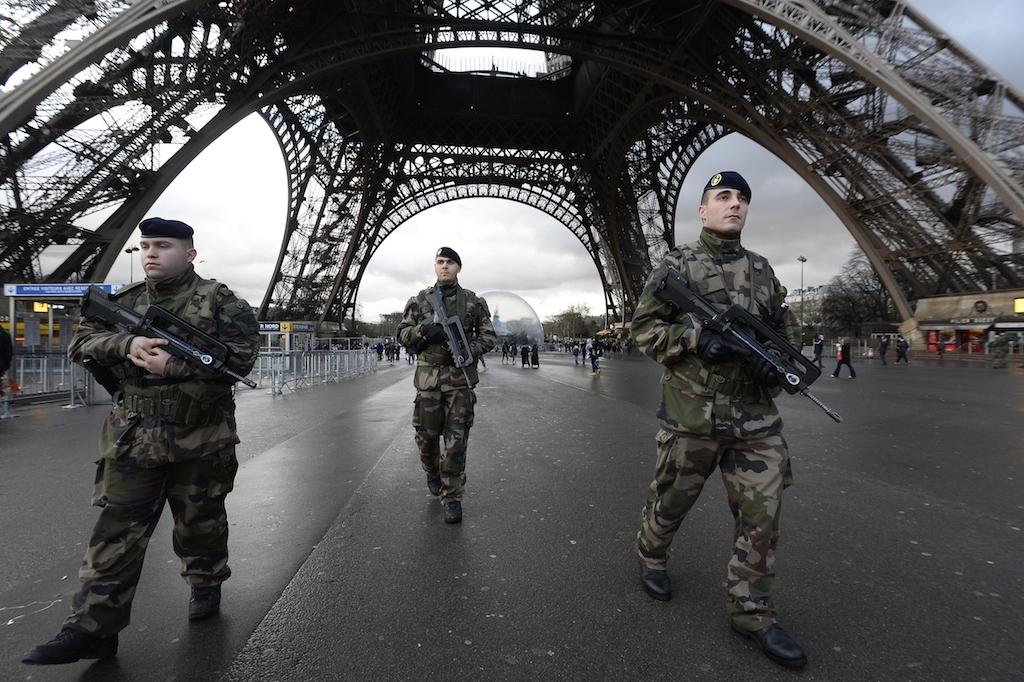Some French want a Patriot Act, but they have something even tougher
French soldiers patrol the Eiffel Tower on Jan. 8.
LONDON — Hours before 3.7 million people took to the streets of France earlier this month in solidarity with the victims of the Paris shootings, a former minister in the French government tweeted that the country should adopt its own version of the United States Patriot Act.
Valerie Pecresse’s timeline filled with angry “nons," and one “HELL NO” from a bilingual critic. Political rivals dismissed the idea as unnecessary. Uncouth. Un-French.
But human rights lawyers and terror experts say France’s outrage at the suggestion of far-reaching domestic surveillance is “un peu hypocrite.”
Passed hastily after the Sept. 11, 2001 attacks on the US — though containing provisions similar to those proposed under President Bill Clinton back in 1996 — the Patriot Act expanded the US government’s ability to spy on its own citizens, prompting debate on civil liberties at home and abroad.
Yet many Western European countries had already appropriated similar powers of domestic surveillance decades earlier, to combat threats like the Irish Republican Army in Britain, Algerian terrorists in France and the Basque separatist group ETA in Spain.
Forget the Patriot Act. France already has some of the harshest counterterror laws in the Western world.
French authorities do not need a court order to place a wiretap. A broad, vaguely worded law against “association with wrongdoers” lets authorities arrest and jail people whose actions assist a person carrying out a terror attack, even if they were unaware of the terrorist’s intentions.
“France has already had extensive intelligence powers for a long time, some of which are equal to or go beyond the Patriot Act,” said Frank Foley, a lecturer at King’s College London and author of the book “Countering Terrorism in Britain and France: Institutions, Norms and the Shadow of the Past.”
“At this stage, they’re looking at their wish list and thinking, what else would I like?”
On Wednesday, Prime Minister Manuel Valls announced a nearly $500 million package of anti-terror measures, including 2,600 new counterterror jobs, more Muslim clergy to tend to French prisoners and increased prosecution powers.
Lawmakers in France had refrained from passing major counterterror measures since the two-day crisis of shootings and hostage-taking in Paris earlier this month that left 20 people dead, including three suspected gunmen.
While the circumspection was welcome, rights advocates said they don’t think it will last.
“We know they could do it, because they have done it in the past,” said Clemence Bectarte, a lawyer and Legal Action Group coordinator for the Paris-based International Federation for Human Rights (FIDH).
Former President Nicolas Sarkozy toughened France’s anti-terror laws five separate times during his administration, according to FIDH. Current President Francois Hollande has twice stepped up terror laws since taking office in May 2012.
The most recent reform, in September, made it easier for the government to collect residents’ personal data and pursue “lone wolf” terror suspects acting outside of an organization. It was passed with little opposition.
The reforms are “always in the sense of more repression, more infringement on liberties,” Bectarte said.
It’s a trade the French public has largely accepted.
“The predominant view in France is that the security of the republic supersedes other considerations,” Foley said.
“French police and intelligence officers rarely find themselves subject to harsh public scrutiny for being overzealous when dealing with Islamist terrorism. They operate in a relatively permissive environment,” he wrote in an email.
When former US National Security Agency contractor Edward Snowden revealed the extent of the government’s domestic surveillance program in 2013, 82 percent of French respondents to a Pew poll said that Americans spying on their own citizens was unacceptable. It was one of the highest disapproval rates of any country surveyed.
After it was revealed that the US had intercepted diplomatic communications from France and other countries, politicians from the far-right National Front to the leftist Green and Socialist parties called for Snowden to be granted asylum in France.
But six months later, when the French government amped up its own extensive domestic surveillance program, the public response was muted. In a survey last week by pollster Harris, 77 percent of French said they favored more surveillance of social networks by counterterror agencies, even if it meant sacrificing civil liberties.
As critics have pointed out, surveillance alone won’t stop an attack. French authorities were aware of the Kouachi brothers’ increasing radicalization, but were unable to stop them before they turned violent.
“It’s quite clear that the problem in the recent case wasn’t that there was a lack of data,” said Joe McNamee, executive director of the Brussels-based digital rights group EDRi. “It was that the data wasn’t being used effectively and intelligently.”
Researcher Elise Stern in Paris contributed to this report.
The article you just read is free because dedicated readers and listeners like you chose to support our nonprofit newsroom. Our team works tirelessly to ensure you hear the latest in international, human-centered reporting every weekday. But our work would not be possible without you. We need your help.
Make a gift today to help us reach our $25,000 goal and keep The World going strong. Every gift will get us one step closer.
